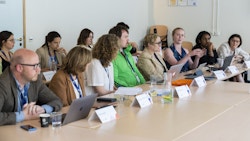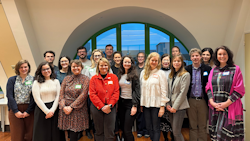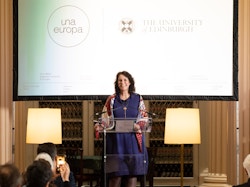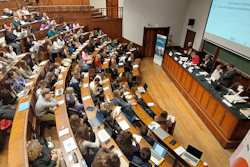How does Una Europa envision Mobility for All?
‘Mobility for All’ refers to a range of international experiences for our students. They could be in person, blended or virtual, but together they represent inclusiveness, accessibility and equitable opportunities for all our students. ‘Mobility for All’ really focuses on the equity, diversity and inclusion aspect of mobility and actively works towards ensuring that the opportunities Una Europa is creating are accessible to all our students, not just those who can afford it.
What is driving the alliance's current steps towards realising Mobility for All?
Our alliance’s vision for Mobility for All must take into account two things. One is the very ambitious 50% target for student mobility that has been set by the European Commission: for Una Europa, that equates to around a quarter of a million mobility experiences. To achieve this, we have to think creatively, to go beyond traditional forms of mobility.
The second driver is of course our students, who increasingly recognise the importance of mobility and how it enriches their ability to secure the job they want and kickstart their career. In particular, the Una Europa Student Board has stressed how absolutely vital mobility is to students’ futures, but that traditional mobility experiences are not inclusive or accessible. Acting on this, our focus is on making sure all students understand not only the importance and value of an international experience, but that these are available to everyone. It’s up to us to address the barriers students face in accessing mobility experiences, but also to diversify our range of opportunities and make sure that everything we do considers the equality and accessibility of those opportunities.

Discussing student mobility at the joint meeting between the Una Europa Student Board and Board of Directors at Universiteit Leiden in June 2023.
So what steps are Una Europa taking towards making Mobility for All a reality?
To move forward, we first need to ensure we have consensus across the 11 partner universities of the alliance on what our priorities should be for student mobility, taking into account the different institutional contexts, mobility strategies and student demands of our partners. We are about to embark on a prioritisation exercise to achieve this alignment, inviting partners not only to reflect on their own mobility priorities but also to apply the Una Europa lens and consider how we, as a collective, can really make an impact.
The prioritisation exercise will be undertaken by stakeholder groups that represent each university and each community group within the university structure, from Vice-Rectors to mobility officers to the student voice. Through these stakeholder groups, we aim to identify which area of mobility we should be focusing on collectively, using the lens of our universities to really examine what is important for Una Europa as a whole. The exercise will open up a purposeful dialogue around student mobility in Una Europa, which we hope will lead to consensus on our priorities and direction of travel.
Can you go into more detail as to how students will be engaged in the prioritisation exercise?
It is mandated that the student voice of every partner university must be adequately represented in the prioritisation exercise. The Una Europa Student Board needs to be involved, but they also must bring in a representative body of their university’s student community. This is to ensure students have a seat at the table, with the intention of working together with staff at our universities to identify where we should be focusing collectively.
The Student Board have demonstrated their commitment to advancing student mobility in the alliance by setting up a sub-team focusing specifically on mobility. They themselves recognise the momentum that we are generating around mobility in Una Europa and they are keen to help fuel it.

Colleagues from EUTOPIA, Circle U., EPICUR, YUFE, EU-CONEXUS and Odisee at Una Europa's 'Innovations in Mobility' workshop in Brussels
Last week you were in Brussels to meet with six other alliances and explore how we act as testbeds for innovations in mobility.
What were your key takeaways from these meetings?
The first thing was the recognition that we’re all dealing with the same opportunities and challenges, not just in Una Europa but in other alliances as well. It was reassuring to hear other alliances say, “We’re also grappling with this, we’re also trying to understand how we move towards the 50% student mobility target” and what that actually means in reality. The workshop offered a safe environment where colleagues felt they could be brave and open about the challenges they’re facing, get feedback and listen to others and together work towards solutions. It was really enriching to bring together a community of like-minded, highly motivated individuals who are all moving in the same direction, but by different paths, and learn from each other.
Something I really appreciated from the workshop was that it gave space for new perspectives that really stretched our mindset on mobility and what is possible. For example, one alliance characterised virtual mobility as being able to appreciate a sense of otherness, to appreciate the other. We exchanged so many fascinating ideas and it was refreshing to gain new perspectives.
The workshop helped to give us all a helicopter view, to look to the horizon and explore what’s possible when you combine the power of alliances. I believe if we build on that, we could create something really spectacular.
Want to find out more about Una Europa's perspective on student mobility? Read our position paper on Erasmus+ programme, Catalysts for innovation: European Universities and the European Education Area.



